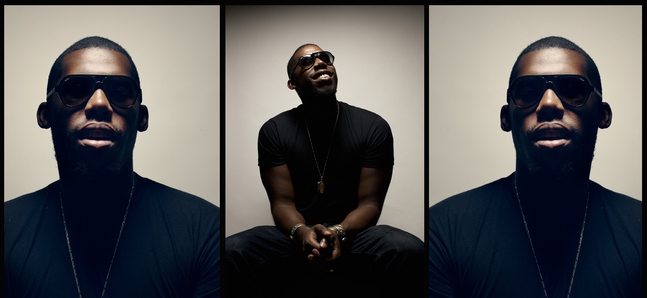Flying Lotus: the interview
The dreams and internal dramas of Steven Ellison

Photos by Tim Saccenti
Posted: Tue Oct 02 2012
When you've just made an album that sounds like someone's mind exploding after an all-night binge of breakbeats, acid and astral jazz, where do you go next? In Flying Lotus's case, the answer was simple: dial it down. Listeners who were overwhelmed by the Californian producer's 2010 album Cosmogramma may find themselves seduced by its follow-up. Until the Quiet Comes is the kind of record that slips over you the first time you hear it, but on closer inspection reveals a dense lattice of ideas and influences. Its creator (real name Steven Ellison) has called the album 'a collage of mystical states, dreams, sleep and lullabies', and the description proves surprisingly apt for a record where even the presence of a few big-name collaborators can't disrupt the flow.
Time Out caught Ellison just after a gym workout in his native LA, and grilled him on lucid dreaming, his Brainfeeder label, working with Thom Yorke and the state of hip hop in 2012.
When I interviewed you after Los Angeles came out in 2008, you talked a lot about lucid dreaming. Has your understanding of that developed since them?
Yeah, and the control has too. I really got into it: I really kind of fly.
When did you first discover how to do that?
I got into lucid dreaming by accident: I had a dream that I had control of as a kid. From that experience on, it's been so fascinating to me that I can create new worlds in my sleep. It's so amazing, in a world that's so kind of predictable, to create worlds spontaneously. As I got older, and started doing more research... it's like a muscle, I think – and as I started working the muscle, it just became a lot easier to navigate. It's reversing the dream world, you know?
Would you say that that's like a defining feature of your music now?
I don't know, I dunno if it's really a defining feature of my music. I feel like it just really helps me to ask questions in the work, maybe. It's such a funny thing to talk about, and to be able to really describe it properly... I think it's beyond words. That's why music is so fun, because we get to really try to take people places, without there needing to be sleep or drugs or whatever. I feel it's kind of bringing forth these new experiences for people… hopefully. [Laughs] Hopefully. Lord willing.
Until the Quiet Comes has definitely grown on me – on the first listen I felt it was kind of slight, but the more I listened to it, the more it got under my skin.
Yeah, it definitely stands out among all the trap music that's happening right now. [Laughs] All people are listening to is like trap music, so I was like, yeah, it's definitely not like that, is it?
You posted on Twitter that when 'See Thru To U' came out, it felt funny to listen to it as a standalone track...
They're all like the little pieces: little pieces that mean so much in the long run. I feel like I spend so much time trying to thread everything together and find the balance for the music. So even adding bonus tracks – that I have to do because labels say so and all that shit – it really fucks me up, because I try to create this singular experience, and then I get the bonus fucking track and it's like, 'Oh, well, that just takes everything out, my whole story is over', and I have to come back to it. It's really frustrating.
I can imagine. Do you think it's quite hard to demand a listener to sit down and listen to something that's 45 minutes, as opposed to three?
Yeah, definitely, but I feel like my fans expect this out of me, and people who don't like it should just not listen, or toughen the fuck up. I think that there's more to the music than a fucking single or a 12" or a 7", you know? Being in the midst of a lot of music that is, I guess, beat-driven and club-centric, it's kind of hard to promote these kinds of values and this way of thinking – if my contemporaries are like 12" producers, you know?
When Cosmogramma came out, the reviews were really solid, but a lot of people I spoke to didn't really get it. Did you sense that yourself?
Yeah, there are some people who think that Los Angeles was probably the best thing that I've done. I don't think so. [Laughs] But, you know: different school, different class.
Do you think that this one's going to be more accessible?
I think in a way it is. I think I tried, again, to find a better balance between all the things that I like in my music, the things that I gravitate towards; the things that are very sentimental to me, versus the things that I find really fun and meaningful. I dunno. I really don't know what's going to happen. I know one thing: I set out to make this record different from the last. I didn't want to repeat myself, or try to outdo myself in that way, like, 'I'm just going to go even BIGGER and even CRAZIER and MORE psychedelic and trippy!' I thought: What if I tried to make something that felt really intimate and personal, instead of something very broad and far-reaching? That was kind of my mentality in putting it all together.
From your point of view, how do you think your art has developed on this album?
I think it's just more mature – in understanding my tools a little bit better, understanding the things that I like. You know, trying to understand things that I haven't done so much. I listened to a lot of old psych rock and prog rock stuff as influences, and just tried to bring that into my sound somehow.
I was interested that you mentioned '70s prog rockers Gentle Giant as an influence…
Yeah, 'DMT Song', man.
Have you listened to them for a while?
Yeah, I've been listening to Gentle Giant for a while. But the thing about it is, they're one of those bands where you can hear it and you're like, 'Okay, that's cool', and then in the right situation a person will play it for you and you're like, 'What the fuck is that?' It's like, 'Green Giant, man, you know this shit.' 'Oh yeah! Fuuuck!' You know? You're totally hearing it with new ears when the right situation and scenario occurs. It's like having new ears on this shit.
It's funny, because it feels like music like that fell out of favour for a long time, and then it's come around again.
Right, right, right. [Laughs] Yeah, exactly. There's some shit on there that's not awesome. [Aside] Wow, this girl is fucking fine. Oh my god. I love LA. Anyway… Yeah, I mean, there's a lot of that shit that is not awesome, a lot of shit that is corny, but then there's a lot of cool shit with the vocal harmonies and stuff. The way they layer the vocals is really clever, I think: that's something that Thundercat and I were really big fans of, doing little different harmonies and vocal arrangements and whatever. It was just like a cool point of reference for us.
Another one I wanted to ask about, with Erykah Badu – I know you guys go back quite a way, but how did you first hook up with her?
Actually, we don't really go back that far, to be honest. I met her through Thundercat, because he plays in her band. I think around when I was producing his album [2011's The Golden Age of Apocalypse], he was playing it for her, and she was really interested in working with me after she heard what he was up to. And then we met that way and, you know, we talked about doing an album, she started to come out to LA, we made a few demos, but the one track that we got was the one that kind of stuck. I don't know what's going to happen next, but I'm definitely down to work if she is.
Would you say that you guys have a fair amount in common?
I'd say, yeah. She reminds me of my mother, in a way. It's really strange.
I knew there was going to be another Thom Yorke collaboration on the album, too, but when I heard 'Electric Candyman' I didn't even realise it was him.
Yeah, yeah. That's what everyone's saying.
I think partly it's the way that you process his voice, but also the kind of vocal line he's doing isn't something I've ever heard him do before.
Yeah, yeah, it's definitely a little out of his realm, conceptually. It was fun, it was fun to write. A lot of people are always like, 'Oh man, you've got Thom Yorke! You should try and make a banger out of it, make a hit!' I didn't try to do that: I'm trying to make my album, you know? [Laughs] And then Thom Yorke has a piece of it. I don't know, man: I think people, they say they want me to do things, but they really just want me to do what I wanna do. [Laughs]
I guess there's the risk that it can distract from what you're doing if everybody just focuses on that one guy on that one track.
Yeah. But I think it's funny: I think at the end of the day, I'm still gonna do what I wanna do and shit. It don't matter who the fuck it is: if I'm producing someone, they're stepping into my universe. It's not me trying to accommodate them.
Do you think that your experience of working with a band affected how this album turned out?
Absolutely, absolutely. I think I needed to have the experience of the band to kind of learn to communicate to musicians better, in the overall sense, but also I think it helped to just get out some ideas that I've always wanted to get out, and get sounds on record that I've always wanted to have on my records. It definitely helped this time around. I've learned a lot of restraint since the last album, too. There's something to be said for tension and release: building up moments and having these really nice, quiet moments after it; building things up, breaking things down and just giving some of them a chance to breathe, and then just taking the air out from under them again. I love doing things like that – more than just, like, 'Oh man, balls-to-the-wall, everything all at once!' Which is what I've done before.
I guess that stuff can get old pretty quickly, right?
It can, it can. And I did that already. I don't need to do that anymore – or at the moment, at least. I thought that if I try to get into that spirit, it'll be more contrived than it being honest.
You said on Twitter that you were pretty psyched about the videos for this album. What kind of things can we expect?
There's a bunch of things in production, with some really amazingly talented filmmakers, and there's a big video with another actor in it as the lead, but… I don't think I should be giving any of it away. It's awesome, though: I think the stuff that's coming out is gonna be really, really cool.
Since you've been making some videos of your own over the past few years, are you quite involved in conceptualising your own ones?
Yeah, definitely. I hand-picked all the directors and I explained to them what the concepts mean to me, and I've been overseeing all the editing and everything and just kind of giving my two cents. But at the same time, I took these people, so I trust them to do what they do.
You can't oversee absolutely everything, right?
Nah. But I try to get in there as much as I can. Just because I'm a fan of the process as well.
I wanted to ask about your Brainfeeder label quickly, since some of the albums you've put out over the past few years came as a surprise to me: the Austin Peralta one, for instance, and Martyn's Ghost People. Would you say there are any kind of parameters you have for the label?
No. All the people who I released up until the past year were all my friends, my associates, and we kind of share similar tastes in beats. But now that we're expanding beyond just my homies, I think it opens up a little bit more. I think the parameter that I look for, the thing that I seek, is I listen for people who are kind of searching for things in their music – if that makes any sense. I feel like I can hear people trying to understand life, and try to make sense of their world through their sound. I always try to bend my ear towards that: the tortured artist kind of thing. I'm a sucker for that, I think.
So what have you got in the pipeline?
We're putting out the Gaslamp Killer album, we've got a kid called My Dry Wet Mess – we're putting his album out, it's got more of a beat flavour. We've got some jazz records coming out, by a kid called Kamasi Washington, as well as this really experimental ambient artist named Miguel Baptista Benedict. I think that those sounds are all quite different.
Are there any other people outside of the LA scene who you're really into at the moment?
Yeah, there's so many people. I've been listening to a lot of rap again, all the cool stuff happening in rap, like SpaceGhostPurrp, Odd Future, Childish Gambino, all the TDE stuff with Kendrick Lamar and Schoolboy Q and Ab-Soul, all that shit – I love all that. I've been kind of getting back into rap again. It's been a good year for hip hop, for sure.
Apart from trap?
Look: I'm not trying to diss that shit at all, I love it. But, fuck man, every party I go to it's all I'm hearing. It's fucking boring, dude. It's like dubstep again. They'll get over it, though. You know what the weirdest part of it is? This music has been happening since '09 – way earlier than that, actually; Dirty South music's been since 2000. Now I go to Sweden and shit, and there's kids making that kind of music that have no idea. I don't know, it just freaks me out a little bit, but I'm getting over it. [Laughs]
Until the Quiet Comes is out now on Warp Records/Beat Records. Flying Lotus plays at Electraglide 2012, November 23 at Makuhari Messe
Tweets
- About Us |
- Work for Time Out |
- Send us info |
- Advertising |
- Mobile edition |
- Terms & Conditions |
- Privacy policy |
- Contact Us
Copyright © 2014 Time Out Tokyo














Add your comment